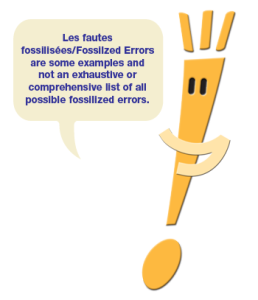Fossilized Errors
Fossilized Errors | Les fautes fossilisées

What is a fossilized error?
It refers to an error that is made so often that it has become a natural part of the person’s speech.
There are a number of factors that contribute to the phenomenon.
One is over-generalization of rules.
In English, it is easy to over-generalize. For example, the addition of “s” in the third person singular present. It is easy for students to remember I come, we come, they come. Students can forget to add the “s” to “he comes” because they over-generalize the rule and apply it to all the verb forms.
Another factor is the constant use of false friends (les faux-amis).
For example, in French “sympathique” means nice when referring to a person. In English, the word “sympathetic” has a different meaning. If French students are not corrected in their use of the word sympathetic, they can believe they are using it correctly. Regular use of the word in the wrong context without correction leads to a fossilized error. This concept can also be seen in the use of the present perfect. Many languages have a tense that resembles the form of the present perfect, (i.e., has/have and the past participle). However, most languages use this tense in different ways than in English.
When students are aware of the error and the teacher has checked to ensure they understand the language point, correction is needed each time the error is made.
It can take a long time to redress a fossilized error, so patience and good humour are needed. Of course, the easiest way to deal with them is by prevention. One should correct these most common errors before they become entrenched and fossilized.
✗ Je suis fini (I am finished)
✗ J’ai allé (I went)
✗ Il a allé (He went)
✗ J’ai revenu (I am back)
✗ sur l’autobus (on the bus)
✗ sur lundi (on Monday)
✗ le mon, le ton, le son (mine, yours, his)
✗ Cela regarde beau (That looks good)
✗ sur le téléphone (on the telephone)
✗ sur la télévision (on television)
✗ Je suis faim (I am hungry)
✗ J’ai a (I have)
✗ Je suis douze ans (I am twelve years old)
✗ mon mère, ma père (my mother, my father)

 Translate
Translate